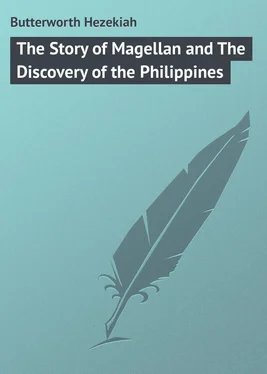Hezekiah Butterworth - The Story of Magellan and The Discovery of the Philippines
Здесь есть возможность читать онлайн «Hezekiah Butterworth - The Story of Magellan and The Discovery of the Philippines» — ознакомительный отрывок электронной книги совершенно бесплатно, а после прочтения отрывка купить полную версию. В некоторых случаях можно слушать аудио, скачать через торрент в формате fb2 и присутствует краткое содержание. Жанр: foreign_prose, на английском языке. Описание произведения, (предисловие) а так же отзывы посетителей доступны на портале библиотеки ЛибКат.
- Название:The Story of Magellan and The Discovery of the Philippines
- Автор:
- Жанр:
- Год:неизвестен
- ISBN:нет данных
- Рейтинг книги:3 / 5. Голосов: 1
-
Избранное:Добавить в избранное
- Отзывы:
-
Ваша оценка:
- 60
- 1
- 2
- 3
- 4
- 5
The Story of Magellan and The Discovery of the Philippines: краткое содержание, описание и аннотация
Предлагаем к чтению аннотацию, описание, краткое содержание или предисловие (зависит от того, что написал сам автор книги «The Story of Magellan and The Discovery of the Philippines»). Если вы не нашли необходимую информацию о книге — напишите в комментариях, мы постараемся отыскать её.
The Story of Magellan and The Discovery of the Philippines — читать онлайн ознакомительный отрывок
Ниже представлен текст книги, разбитый по страницам. Система сохранения места последней прочитанной страницы, позволяет с удобством читать онлайн бесплатно книгу «The Story of Magellan and The Discovery of the Philippines», без необходимости каждый раз заново искать на чём Вы остановились. Поставьте закладку, и сможете в любой момент перейти на страницу, на которой закончили чтение.
Интервал:
Закладка:
"He was so surprised, sire, at what I told him, that I also was surprised; but he replied to me with the best words in the world, saying that on no account did he wish to offend your Highness, and many other good words; and he suggested that I should speak to the Cardinal, and confide the whole matter to him.
"May the Lord increase the life and dominions of your Highness to his holy service. From Saragoca, Tuesday night, the 28th day of September.
"I kiss the hands of your Highness,
"ALUARO DA COSTA."Court intrigue against Magellan did not avail. There was one thing statecraft could do. It could set spies on Magellan on board his own ships. This it succeeded in doing.
There was in Spain at this time a Portuguese adventurer and navigator by the name of Estevan or Esteban Gormez – Stephen Gormez.
He was a student of navigation, and was restless to follow the examples of Columbus and Vasco da Gama. He had applied to the court of Spain – probably to Cardinal Ximenes, for a commission to go on a voyage of discovery and he had received a favorable answer, and was preparing to embark, when Magellan appeared at court and promised to find the Spice Islands by way of South America.
Magellan's scheme was so much larger and definite than that of Gormez that the court canceled its favors to the lesser plans, and Gormez had to abandon his prospects of sailing under the royal favors of Spain.
The eyes of Spain were now fixed on Magellan.
"I will find a way to the Spice Islands by South America or by the West," said Magellan to the ministers of the King, "or you may have my head."
These were bold words. Magellan had not only been to the Spice Islands, but he had gone out on the very voyage that discovered some of them. He had behaved heroically on the voyage. So his application to the court superseded the plan of Gormez and the latter sunk out of sight.
In his despondency at the failure of his plans, Gormez came to Magellan.
"My countryman," said Gormez, "your schemes have supplanted mine and turned my ships into air. I was the first to plan a voyage to the Moluccas out of the wake of hurricanes and monsoons. I do not feel that I have been treated rightly. Something surely is due to me."
Magellan was a man of generous impulses. He saw that Gormez had a case for moral appeal.
"My friend," said he, "you shall have a place in my expedition."
He could but think that the inspiration and knowledge of navigation of his countryman would be useful to him, and he pitied him for his disappointment, knowing how he himself would feel were his plans to be set aside.
So Gormez, the Portuguese, was made the pilot of the Antonio.
Magellan, had he reflected, must have seen that this man would carry with him envy and jealousy, passions that are poisons. But Estefano, or Esteban, or Stephen Gormez, took his place at the pilot house of the Antonio to follow the lantern of Magellan, but the hurt in his heart at being superseded never healed.
On the ships also was one Juan de Carthagena, captain of the Concepcion, a spy, and one of the "malapots" of the expedition. He was called the reedor , or inspector. He inspected Magellan, and Magellan inspected him, as we shall see.
And now the flags arose in the clear air, and the joyful fleet cleared the Guadalquivir and leaped into the arms of the open sea, amid the acclamations of gay grandees and a happy people.
It was September 20th when the anchors were lifted, of which probably one was destined to come back in triumph after an immortal voyage that encompassed the earth, and gave to Spain a new ocean.
And the King of Portugal ordered the coat of arms to be torn down from the house of Magellan, as we have pictured at the beginning of our narrative.
CHAPTER VII
"MAROONED."
The expedition moved down its western way, over the track of Columbus. It had left poor Ruy Faleiro behind – he who had seen the progress of it all in the fitful light of a disordered vision. He had not relinquished his own high aims. He hoped to follow Magellan with an expedition of his own.
The ships were furnished with "castles," fore and aft; they carried gay pennons and were richly stored. The artillery comprised sixty-two culverins and smaller ordnance. Five thousand or more pounds of powder were shut up in the magazines, and a large provision was made for trading with the natives – looking glasses for women, velvets, knives, and ivory ornaments, and twenty thousand bells.
Magellan's ship bore a lantern, swung high in the air amid the thickly corded rigging, which the other ships were to keep in view in the night. What a history had this lantern! It gleamed out on the night track of a new world, a pillar of fire that encompassed the earth as in the orbit of a star.
The fleet had fifteen days of good weather and passed Cape Verde Islands, running along the African coast.
But the fleet carried with it disloyal hearts. The Portuguese prejudice against Magellan sailed with it. The Spanish sailors distrusted the loyalty of Magellan to Spain.
The commander was a man of great heart, chivalrous, and noble, but he could be firm when there arose an occasion for it.
After leaving Teneriffe Magellan altered his course.
Juan de Carthagena, captain of the San Antonio, "the inspector" and a spy, demanded of Magellan why he had done so.
"Sir," said Magellan, "you are to follow my flag by day and my lantern by night, and to ask me no further questions."
Carthagena demanded that Magellan should report his plans to him. Finding that the Admiral was bent on conducting his own expedition, he began to act sullenly, and to disobey orders.
Again the captain of the San Antonio demanded of Magellan that he should communicate his orders in regard to the course of steerage to him. He did this by virtue of his office as inspector. He showed a very haughty and disloyal spirit, and if this were not to be checked, the success of the expedition would be imperilled. He was abetted by Pedro Sanches, a priest. Magellan saw treason already brewing, and he determined to stamp it out at once.
He went to Carthagena, and laid his hands on him.
"Captain, you are my prisoner."
The astonished captain cried out to his men:
"Unhand me – seize Magellan!"
Carthagena had been a priest, and he had great personal influence, but the men did not obey him.
"Lead him to the stocks and secure him there," ordered Magellan.
The order was obeyed. The fallen inspector was committed to the charge of the Captain of the Victoria, and another officer was given charge of the San Antonio.
"When we reach land Juan de Carthagena shall be marooned," was the sentence imposed upon the inspector. A like sentence was imposed upon Sanches.
It touched the hearts of the crews to hear this sentence. What would become of the two priests, were it to be executed? Would they fall prey to the natives, or perhaps win the hearts of the people and be made chiefs among them?
There was a pilot on board the ship who sympathized with the mutineers, but who had close lips, Esteban Gormez, of whom we have spoken. Were the two mutineers to be marooned he would be glad to rescue them.
He had been discontented since the day that his own plans for an expedition had been superseded by those of Magellan.
His discontentment had grown. He became critical as the fleet sailed on. Every day reminded him of what he might have done, if he could have only secured the opportunity.
A disloyal heart in any enterprise is a very perilous influence. A wooden horse in Troy is more dangerous than an army outside.
Magellan in Gormez had a subtle foe, and that foe was his own countryman.
This man probably could not brook to see his rival add the domains of the sea to the crowns of Juana and of Charles, though he himself had sought to do the same thing. Magnanimous he could not be. Discovery for the sake of discovery had little meaning for him, but only discovery for his own advancement and glory.
Читать дальшеИнтервал:
Закладка:
Похожие книги на «The Story of Magellan and The Discovery of the Philippines»
Представляем Вашему вниманию похожие книги на «The Story of Magellan and The Discovery of the Philippines» списком для выбора. Мы отобрали схожую по названию и смыслу литературу в надежде предоставить читателям больше вариантов отыскать новые, интересные, ещё непрочитанные произведения.
Обсуждение, отзывы о книге «The Story of Magellan and The Discovery of the Philippines» и просто собственные мнения читателей. Оставьте ваши комментарии, напишите, что Вы думаете о произведении, его смысле или главных героях. Укажите что конкретно понравилось, а что нет, и почему Вы так считаете.












